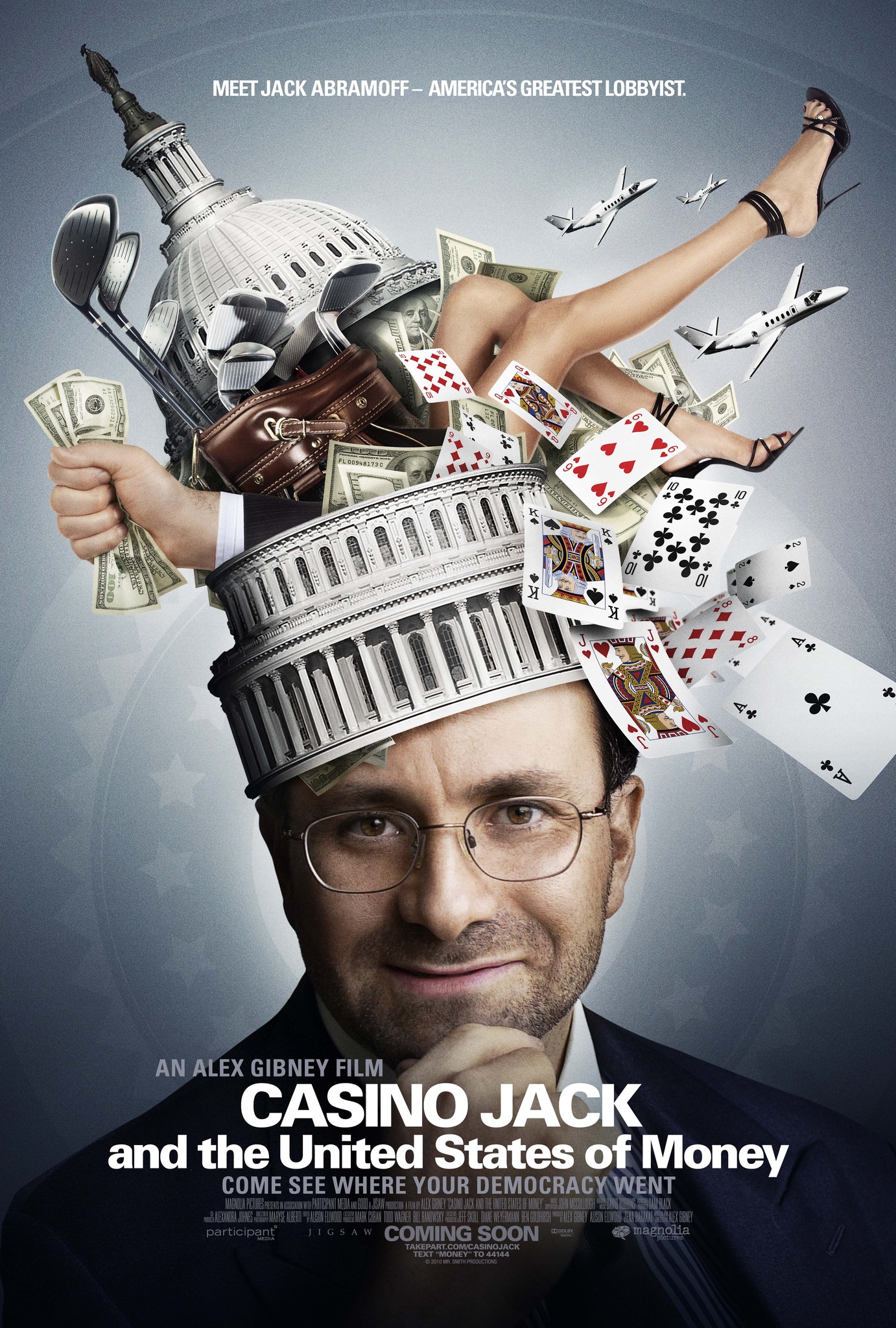 CASINO JACK & THE UNITED STATES OF MONEY (2010, directed by Alex Gibney, 118 minutes, U.S.)
CASINO JACK & THE UNITED STATES OF MONEY (2010, directed by Alex Gibney, 118 minutes, U.S.)
BY DAN BUSKIRK FILM CRITIC
One thing that is agreed upon across the political spectrum — from the Tea Partiers to the Progressive Left — is that our government is rife with corruption and that it favors corporations over the individual. If you want to nurture that cynicism with some cold hard facts, there are few more concise blueprints detailing the way money corrodes democracy than the latest film from Academy Award-winning documentarian Alex (Taxi To The Dark Side) Gibney, Casino Jack & The United States of Money. The tale of uber-lobbyist Jack Abramoff and the scandal that brought him down resonates beyond a single story of corruption. Instead, like that dye a doctor injects to examine your circulatory system, Casino Jack traces the trail of money that Abramoff directed to show us exactly how the powerful warp the democratic system for their own means.
Gibney shows Abramoff, along with fellow travelers Grover Norquist and Ralph Reed, as sort of anti-Yippies, succeeding a decade later where Abbie Hoffman and his Merry Men failed, in taking over U.S. political policy. Starting out as college Republicans who steered the campus group to the far Right, this trio with deep anti-social tendencies (Norquist, for example, was known to keep secret files on his friends) seem to succeed by cleansing themselves of all personal scruples. On a messianic quest to wrest power by any means necessary and seemingly driven by an irrational fear of Communism (thanks Joe McCarthy), Abramoff and his crew were wildly successful in propelling themselves to the heights of governmental power.
Their plan worked so well you would almost be willing to give them some begrudging admiration if they weren’t such goofy creeps. Abramoff himself is a fascinatingly ludicrous self-invention. Raised in Atlantic City and Hollywood, he saw himself as a bigger-than-life character in the mold of those men he studied in spy novels and in the movies. He converted to Orthodox Judaism after seeing Fiddler on the Roof, he consorted with anti-communist dictators through his International Freedom Fighters conference and set himself up as a restaurateur a la Bogey in Casablanca with the D.C. eatery Signatures. But it is in lobbying that he made his mark, becoming a shameless middle man for moneyed interests that need a posse of congressmen to nullify regulations that stand in the way of obscene profit.
And oh, what a tangled web they weave! Like a Scorsese mob film, every few minutes Gibney introduces another shifty player, usually with a colorful thirty-second back story. Take Tom Delay, the disgraced leader of the House who directed the torrent of campaign cash Abramoff supplied and who later became the biggest fish caught in the net. Delay started as an exterminator but when he became disgusted that the government banned his beloved poison DDT he turned to politics to destroy all regulation. Describing regulation as “the hidden tax” it is easy to imagine BP echoing his philosophy in denying the need for things like pipeline shut-out valves. This anti-regulatory impulse became the norm and its terrible price is more apparent now then ever.
Abramoff’s sociopathic scams seem to inevitably devolve into slave labor in the Mariana Islands, a protection racket for Indian Casinos and finally fraud in obtaining a fleet of floating casinos that led to the mob-styled rub-out that frames the film’s story. While Delay, convicted Senator Bob Ney and others appear to tell their side, Abramoff is sadly absent. Nonetheless, an egotist like himself left behind a treasure trove of frank documentation, including some incredibly damning e-mails, proving a shameless thief is rarely a master criminal. Although the story comes to an end with Abramoff locked behind bars, nothing in Casino Jack leads you to believe this system of pay-offs died with his conviction. It is a wise bet that someone sits in his position right now — most likely, not as damnably entertaining as Casino Jack, that skunk.
